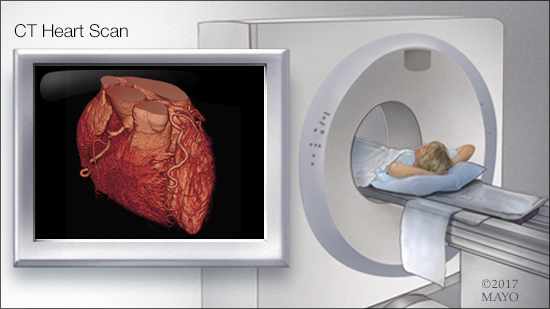-
Cardiovascular
Mayo Clinic Q and A: Do I need a heart scan?
 DEAR MAYO CLINIC: I’m a 57-year-old man, and my doctor recently recommended I have a CT scan of my heart to look for calcium in my arteries. I’ve never had heart problems. Is this test really necessary?
DEAR MAYO CLINIC: I’m a 57-year-old man, and my doctor recently recommended I have a CT scan of my heart to look for calcium in my arteries. I’ve never had heart problems. Is this test really necessary?
ANSWER: A heart scan is used to check for calcium in the lining of the heart's arteries — an early sign of heart disease. Typically, the test is most useful in men between 50 to 60 and women 60 to 70 who may have a moderate risk for heart disease or whose heart disease risk is unclear.
Heart disease happens when arteries in the heart become narrowed or blocked. That’s most often a result of inflammation and deposits of plaque that build up in the arteries. Plaque, made up mainly of calcium, fats and cholesterol, builds up slowly over time. Calcium is deposited in the lining of heart arteries as the body repairs damage within the artery. Its presence signals that something is damaging the artery. The damage could be a result of high blood pressure, high cholesterol, stress or genetics, among other factors. A heart scan can reveal if you have any calcium in your heart’s arteries.
The test itself doesn’t take long — usually about 10 to 15 minutes. The entire appointment may take up to an hour. The risks associated with a heart scan are minimal. A heart scan exposes you to radiation, but the amount is considered safe. It’s about the same as you’re naturally exposed to in a year. If you're concerned about the risks of a heart scan, talk with your health care provider.
The amount of calcium a heart scan detects — when coupled with other information, such as your blood pressure, cholesterol levels, age, family history and health history — can give your health care provider valuable information about your overall risk for developing heart disease.
Although a heart scan often can provide helpful information regarding a person’s risk of heart disease, it’s not right for everyone. The test typically is not recommended for men younger than 40 or women younger than 50. That’s because it’s rare to be able to detect calcium development with a scan during those younger years.
Also, a heart scan is not necessary for people who already know they have a high risk of heart disease or for people who have symptoms of heart disease. For these individuals, results of a heart scan won't provide any additional useful information.
For someone in your age range, though, a heart scan can be an excellent way to assess the early signs of heart disease. That’s particularly true if other health conditions or lifestyle factors may point to a possible increase in your heart disease risk. If a heart scan shows calcium deposits, that can help you and your health care provider decide on ways to reduce your risk moving forward. If the test shows you don’t have calcium in your heart arteries, that puts you at a low risk for a heart attack over the next five years.
It’s important for a heart scan to be used as part of a comprehensive heart health assessment. Some medical facilities offer walk-in heart scans to the general public, without a referral from a health care provider. Using such a service can pose several problems. First, the cost may not be covered by insurance. Second, a heart scan is only valuable in a select group of people. If you don’t fall into that group, having the test done is not worthwhile. Third, if the results of the test aren’t interpreted within the context of your health overall, they may not give you an accurate picture of your heart disease risk. — Dr. Stephen Kopecky, Cardiovascular Diseases, Mayo Clinic, Rochester, Minnesota







